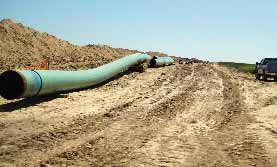SEJournal Online is the digital news magazine of the Society of Environmental Journalists. Learn more about SEJournal Online, including submission, subscription and advertising information.
Feature
By LISA HYMAS and CHIP GILLER
Energy, enviro catchphrases to listen for and what they’ll mean
Don’t expect the environment to be in the spotlight in national political campaigns this year — the economy and the culture wars look to be the stars of 2012. Still, environmental issues are getting talked about, often obliquely as part of larger discussions about energy.
|
|
|
To help combat climate change, a nationally designated demonstration area of riparian buffer zones on private farm lands in Iowa combines multiple rows of trees, shrubs and native grass. PHOTO: |
In politician speak, energy policy has become a proxy for economic policy, a way to talk about stances on job creation and stimulus spending and free-market capitalism. But the words don’t always mean what you might think they mean.
Here’s a guide to energy and environmental buzzwords you’ll be hearing — or not hearing — this election year:
Climate: In 2008, from the presidential candidates on down the ticket, Democrats and Republicans alike offered up grand plans for combating climate change. But you won’t be hearing “climate change” or “global warming” in many of this year’s stump speeches — and that absence speaks volumes.
President Barack Obama thinks he’ll reach more independents by talking about energy innovation, clean energy, and an “all-of-the-above” energy strategy (snatched right from the Republican playbook). Many of his fellow Democrats are following his lead and letting climate stay in the background, especially after the ignominious death of climate legislation in 2010.
The GOP’s Mitt Romney doesn’t like to talk about climate change because he’s been accused of flip-flopping on the issue. Most Republicans in Congress or at the state level bring up climate change only if they want to voice their skepticism. Former GOP Rep. Bob Inglis (S.C.) is launching a new group to promote conservative solutions to climate change, but don't expect that effort to gain much traction this year.
|
|
|
A portion of the Keystone Pipeline under |
Keystone: If you hear a politician say the word “Keystone” this year, you can bet s/he’s a Republican.
The Obama administration in January denied a permit for the Keystone XL pipeline that would carry tar-sands crude from
Many Democrats, meanwhile, are walking on eggshells around this one. They don’t want to anger the green wing of the base, which showed its might by elevating Keystone into a national issue last year. But they also don’t want to be painted as anti-job or tick off any of the unions that want to help build the pipeline (the labor community is split on the issue).
A poll released by Hart Research in February suggested that the Keystone fight is winnable for Democrats if they articulate a clear message — for instance, that the pipeline would create only 2,500-4,500 temporary construction jobs, according to researchers at
Stay tuned to see if Dems will seize the opportunity.
Solyndra: If you hear a politician say the word “Solyndra”this year, you can know s/he’s a Republican.
Republicans will keep harping on the bankruptcy of solar company Solyndra, which got a federal loan guarantee of more than half a billion dollars. They say it shows the folly of the federal government trying to pick winners in the energy sector and boost the economy through stimulus spending. (Mitt Romney even slipped up early on the campaign trail and said “Solyndra” when he meant “Keystone,” betraying the fact that Republicans see both issues primarily as cudgels with which to attack Obama.)
Obama has been defending his administration’s Solyndra investment, albeit without mentioning the company’s name. His first TV ad of the campaign season went after his Solyndra critics, and in his State of the Union address, he said, “Some technologies don’t pan out; some companies fail. But I will not walk away from the promise of clean energy.” Other Dems have been less sure-footed in their responses to the Solyndra mess. Expect them to avoid the topic whenever possible.
Fracking: Hydrofracking for natural gas is turning into a flash point this year. Environmental activists are campaigning hard for stricter regulations or even outright bans on the process, which has been linked to groundwater pollution and possibly even earthquakes.
Republicans counter that risks are being hyped and we need to exploit this domestic source of energy.
President Obama is trying to walk a middle line: he’s calling for more fracking, but his administration is working on rules that will require companies to curb their air and water emissions and disclose the chemicals they use. Other Democrats span the spectrum from firmly pro-fracking to decisively anti-, with a good number uncomfortably in between.
Green jobs: You’ll hear this phrase less often than in past years — it’s lost some of its luster. But the issue of how many jobs might be created or lost as a result of energy policy decisions is bigger than ever.
Obama spotlighted a wind-turbine worker during his State of the Union address, and he and the Democrats will keep talking about the economic promise of a clean energy economy. Rep. Ed Markey (D-Mass.) is taking this line of argument even further, saying the administration’s new rule requiring cuts in mercury emissions from power plants will create more jobs than the Keystone pipeline would have, as utilities will have to hire engineers and construction workers to outfit old plants with scrubbers.
Republicans and their allies are countering by talking about “energy jobs” — the kind that come from building pipelines and mining coal and fracking. “Drill baby drill” talk continues to resonate with the GOP base. Still, two Republican governors —
Poll after poll finds widespread support from voters across the spectrum for renewable power, so watch to see which politicians try to tap into that vein.
And more:
The Environmental Protection Agency used to get bipartisan support for efforts to clean up air and water, but Republicans in Congress are increasingly accusing the agency of overreach. With the EPA poised to release new rules for power plants and fracking this year, attacks from the GOPcould escalate.
Talk of energy subsidies will bubble up periodically, and that phrasing generally means that a politician doesn’t favor the form of energy being subsidized. If s/he does like an energy source, you’ll hear words like “investment” and “support” and “job creation,” and talk of “subsidies” will be sidelined.
If gas prices go up, expect to see Obama assailed by Republicans on that front, even though his administration is opening up a number of offshore areas to new oil drilling. Oil prices are determined by global commodities markets, not by the actions of an American administration, but most politicians glide right over that fact.
Lisa Hymas is senior editor at Grist.org, a leading independent source of online environmental news and analysis, reaching a monthly audience of one million.
Chip Giller is founder and CEO of Grist.org. He was named a Time Magazine “Hero of the Environment” in 2007 and was honored with a Heinz Award in 2009.
* From the quarterly newsletter SEJournal, Spring 2012. Each new issue of SEJournal is available to members and subscribers only; find subscription information here or learn how to join SEJ. Past issues are archived for the public here.







 UNIVERSITY OF MARYLAND VIA FLICKR.
UNIVERSITY OF MARYLAND VIA FLICKR.






